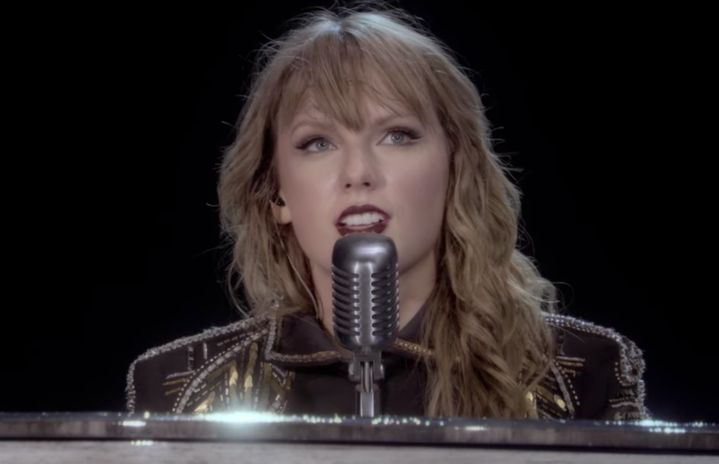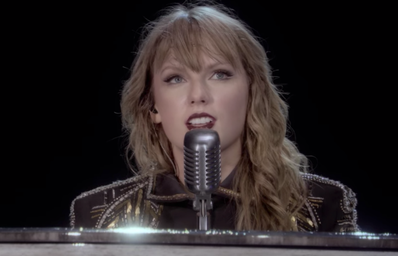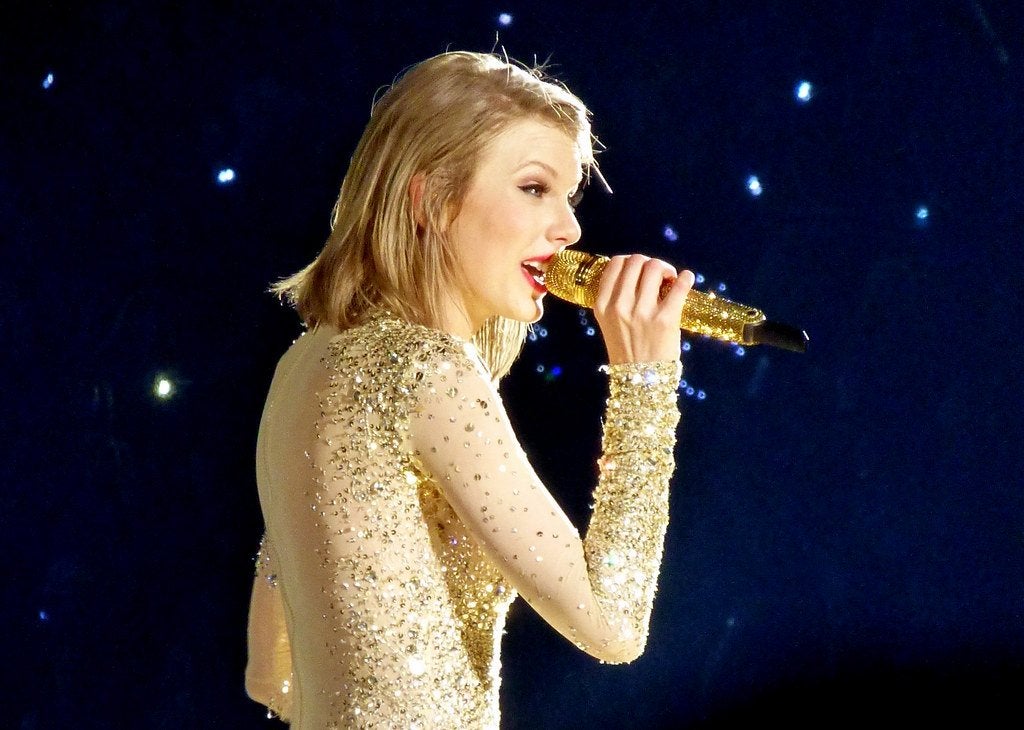Taylor Swift just broke the record for the most Album of the Year Grammy awards after winning her fourth Grammy 2 weeks ago for her album “Midnights.” The album also broke several other records, some of which were previously held by Swift’s other albums. For example, Midnights occupied the entire top ten of the Billboard 100, making Taylor Swift the first artist to ever accomplish that. This also made Swift the woman with the most top-ten hits in the chart’s history. It’s safe to say Swift has earned her place in the history books as a legend among artists. So why is she getting so much criticism?
Let’s look back at her career in 2015. Swift had just released her first ever pop album, “1989,” and was on a wildly successful world tour. She was selling out stadiums everywhere she went and singles “Bad Blood,” “Shake it Off” and “Blank Space” charted on the US Billboard Hot 100. Shortly after the tour would end, Kim Kardashian would leak a three-minute snippet of a phone call between her then-husband, Kanye West, and Taylor Swift. This short recording of the call seemingly showed her giving Kanye permission to reference her in his song “Famous” with the line “I feel like Taylor Swift might owe me sex.” What the call didn’t show, however, was Swift giving Kanye her consent to include the line that ended up being a part of the final song, “Why? I made that b*tch famous.” Although she publicly addressed the recording by saying she never gave him permission to call her a b*tch, it was too late. The internet began picking apart every aspect of her career, personality, looks, and discography. “#TaylorSwiftisOverParty” began trending on Twitter as posts came flooding in explicitly describing how much people hated her and how excited they were that her career would finally be over.
Why were people so quick to take Kim and Kanye’s side, even when the phone call being released only proved that Kanye hid the real line he planned on using when mentioning Swift? Lots of tweets and Instagram posts expressed how people had secretly hated Swift for years, but were only now coming out with it because they felt they finally could. But why? It’s one thing to not listen to her music or feel like it’s not your style, but there was little to no reason she’d come across as hateable at this point in time in her career, except for her overwhelming success. Swift was only 18-years-old when her sophomore album “Fearless” was released. The tour for this album, along with every tour of hers since, sold out within minutes. Swift’s lightning-fast rise to fame was unprecedented among most artists, especially those as young as her. As people began recognizing her as one of the great artists of her generation, more and more people began criticizing her. In all of the unwarranted hate comments, one key component tied all of them together: misogyny.
Since then, Swift bounced back and has continued to come out with nine albums within the past five years, including four re-recordings of her old music bought by Scooter Braun, someone she has publicly spoken out against for purchasing them from her previous record label when she had been trying to buy them for herself. Up until recently, the main people talking about Taylor Swift were her fans, but that would drastically change after the release of her tenth original album “Midnights”, along with the announcement of her sixth world tour named “The Eras Tour.” Since then, there’s been a noticeable trend of people posting on social media seemingly bragging about hating Swift and making fun of her. And ever since she went public with Travis Kelce, tight-end for the Kansas City Chiefs, this now includes part of the NFL audience that hates how often she shows up on their screen. While the average time she shows up on screen for the entirety of a football game is around a minute, every time the camera pans to her, people are quick to complain.
The most recent case of large-scale criticism is surrounding Swift’s announcement of her 11th original album, “The Tortured Poet’s Department.” She announced this album on the Grammy’s stage while accepting her Album of the Year Award for “Midnights,” similar to how she announced that album on the MTV stage during her acceptance speech. While no one had a problem with the announcement in 2022, people are now criticizing her for “stealing the spotlight” or making the Grammy’s all about her. Some people try to argue that the MTV award show is fine for her to make that announcement at, but the Grammy’s is an inappropriate setting. I’ve seen several people say this, but I still have yet to hear a logical explanation as to why that is the case. The noticeable difference between her 2022 album reveal and now is that right now, Taylor Swift is on top of the world. This is not to say that she wasn’t successful in 2022, but currently she has reached a new peak not only in her career but a peak in the music industry that most other artists haven’t hit. Her success is easily comparable, or sometimes even greater, than widely recognized male legends. But whenever this is brought up, people are quick to search for anything that might invalidate this success. Recently, the comparison between Taylor Swift and Michael Jackson has been circulating around social media, which has enraged a large number of people. One common reason I’ve been seeing used to disprove this comparison is that technology has aided in Swift’s success, while MJ didn’t have that same privilege. Although this could be said for any modern artist, I’ve only seen it used against Taylor Swift.
So why do some people get so angry when Taylor Swift is compared to our favorite male musicians in history? My theory is — you guessed it: sexism. I think this holds true when looking at other iconic female artists as well. Bruno Mars and Justin Timberlake are widely respected as pop legends, but Britney Spears, Christina Aguilera, and Kelly Clarkson are rarely met with that same respect. This is not to say that people don’t recognize them as great singers, but the conversations around them often have more to do with their looks, or the latest drama, rather than their talent. This is a phenomenon that is typically only found in conversations around women rather than men, which creates an undertone around female artists that they wouldn’t be as popular as male artists if it weren’t for their bodies or some other factor. We have no problem separating a male artist’s talent from their personal lives, but when we don’t do the same for women, it forms the implications that women are less deserving of their status in the music industry.
Britney Spears is often labeled “crazy” or “deranged” since the early 2000s after shaving her head and attacking paparazzi after being constantly stalked and harassed by them, and now for her social media posts now that she’s been released from her abusive conservatorship. Christina Aguilera spent years only being talked about in the media because of her weight gain or weight loss or her public feud with Eminem. Kelly Clarkson also spent the majority of her career in the early 2000s being talked about in the media for her apparent weight fluctuation. These conversations have often turned to Taylor Swift as well. People are quick to call her crazy for writing breakup songs about her exes, like most male artists do, just as they were quick to point out weight gain when Swift was on her “Reputation” world tour. Taylor has come out and spoken about struggling with an eating disorder merely a few years before that tour, but it doesn’t discourage most from continuing to comment on her body.
And last but not least, the term every female artist has been called at one point or another — “sl*t”. Sl*t is the go-to word to call a woman you don’t like. When male artists get a lot of girls, they’re considered players or ballers, but when women do it, they’re wh*res who spread their legs for anyone. Swift touches on this, along with many of the other points I made, in her song “The Man.” This song also got a lot of hate when it was first released from people saying that she has no right to complain about men being treated better than her when she’s richer than almost every man on the planet. Obviously, this is not the point of the song. In fact, these comments only further prove her point. Men will intentionally misunderstand the message of her song so they can have an excuse to insult her even more. “The Man” is about the vocabulary used when talking about men versus women. Men are often met with respect, leniency, and justifications for their actions, while women are met with criticism for nearly everything they do. Women can say and do the exact same thing a man will say and do —for example, Taylor Swift writing songs about her exes— and be met with two entirely different reactions.
While I understand not liking Taylor Swift or her music, my point here is that as a society, we have a problem with women reaching the level of success that is usually only reserved for men. There is a pattern of finding any excuse, no matter how small, to discredit a woman’s hard work that typically isn’t prevalent when discussing a man. A man can have a public drug or alcohol problem, can get arrested, can say harmful things, get caught lipsyncing, and anything else and not get called the names a woman would get called for doing the same thing. Male artists are held to a different standard than female artists. It’s time we start to unpack the loaded terms we often use when talking about female artists to take a step in the right direction when it comes to giving successful women the applause they deserve.




